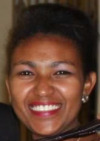 Public Service/Leadership/Community/Networking
Public Service/Leadership/Community/Networking
Yanet Assefa quotes a visionary African saying, “A leader is someone who plants a tree, where he/she will not be able to sit in the shade.” Ethiopia is one of the poorest and fastest growing countries with many social problems, so that many “trees” that shade others need planting.
Yanet points out that almost all countries in Africa have either experienced armed conflict or bordered a country so devastated by conflict that its people have fled their homelands. Ethiopia’s IDPs and refugees in the last decade include a half million people. Children affected by conflict drop out of school and may be forced to join an army or militia. Many lose family, lose limbs, lose their childhood, their lives. Girls and mothers become rape victims. Survivors may be left with health problems and suffer psychologically. Yanet longs to devote herself full time to addressing these problems.
With a background in information management systems, her job title for now is Product Flow Manager and Website Monitor for a horticultural organization that includes multiple farms, shops, and an export service. Yanet communicates with clients, insures timely deliveries, prepares reports, analyzes and monitors data, and updates website promotion through social media.
Yet her heart is most fulfilled when she is helping people. She volunteers for two organizations, one, the Rotaract Club in Ethiopia where she serves as the fund raising director, supporting several projects that help those most vulnerable, such as at-risk children who need school uniforms, tuition fees, and books to continue their education. Sixty-nine children in the program have lost parents to HIV/AIDS. Rotoract also supports the Association for Women Sanctuary and Development, a rehabilitation center and safe house for sexually abused women. Club members also raise awareness to help Core Cancer Ethiopia. Her second volunteer organization is Ethiopian Women Lawyers Association, which also helps sexually abused women though judicial processes. Yanet used her technical skills to create a database for these victims. Such service has enabled her to understand her community and see her role “in problem-solving instead of simply feeling pity.”
Volunteering brings out the best in a person, Yanet believes, strengthening skills, and inspiring further service. She particularly enjoys fundraising because it allows her to network with people from different backgrounds while working for a great cause. Networking with like-minded international young people and courses on mediation and conflict resolution drew Yanet to HSI, as well as supplementing leadership skills, another of Yanet’s priorities.
The book Half the Sky by Nicholas Kristoff and Sheryl WuDunn inspired her. During her undergraduate years, she served on the student council and was an active member of the girl’s club, activities that taught her to be outspoken and proactive in making changes happen. Gradually, she formed a clearer vision about the future of her community. As vice president of her college’s graduation committee, she attended a two-day leadership training seminar. She thought the sessions were great and confesses she thought she’d mastered the techniques. Now she realizes that leadership requires learning throughout a lifetime.
“I believe that leadership means looking at the potential of people, motivating them, and unlocking the potential so that it can be used in an efficient way.” HSI has helped Yanet see that though her efforts have been mainly local, she is working for a bigger change, the attainment of human rights. “Individuals make a difference,” she says. “They make communities. The existence of community is what makes a country, and the existence of countries makes the world, our world.”
